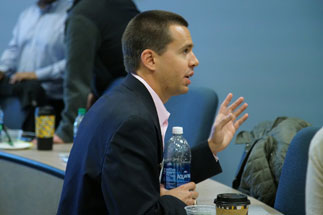News & Stories
Leveraging global economies to drive disruption
 The life span of a Fortune 500 company has fallen from 67 years to 15 years since the list of companies was first compiled in 1955. That means every two weeks a Fortune 500 company is replaced.
The life span of a Fortune 500 company has fallen from 67 years to 15 years since the list of companies was first compiled in 1955. That means every two weeks a Fortune 500 company is replaced.
So what’s driving this disruption?
An increasing number of organizations are leveraging exponential technologies, says Deloitte Senior Manager of Innovation Wes Budrose (MBA ’11). He led a session at the Global Business Center’s Emerging Markets Day at UNC Kenan-Flagler.
The technologies – such as 3D printing, artificial intelligence and robotics – double in power or processing speed every year, while their cost halves.
These technologies have changed the face of domestic business drastically. Think about companies like Uber, Airbnb and LinkedIn – many of which are platforms that have thrived as technology continues to advance. The term unicorn likely comes to mind, as does innovation.
But how and where did Uber innovate? The reality is that the technology it uses, with the exception of some algorithms, wasn’t very innovative.
Instead, Budrose argues, innovation occurred within Uber’s profit model, network structure and, most importantly, consumer experience. Consumers still get in a car and ride from point A to point B, but the experience is certainly can be easier and more pleasant than riding in a taxi. Uber’s power comes from integrating all of these innovations and technologies into a tightly knit offering that’s ripe for consumption.
Tapping into the power of innovation – abroad
“Innovation can be a little mysterious at times to people,” says Budrose, who focuses on applying innovation to the offerings of Deloitte’s offerings and its clients. “I like to think of it as creating something new that has a transformative impact on the market and society.”
Emerging economies provide exciting opportunity for these nations to leapfrog their peers – such as skipping wire-line phones and jumping straight to cellular – and provide a vast economic opportunity for a number of distinct parties.
As one of the largest professional services and consulting organizations in the world, Deloitte identifies opportunities to partner with countries and companies globally to co-develop new business solutions. Coupled with the use of advanced technologies, the possibilities are endless.
But Budrose says these projects require countless considerations, discussions and compromises in order to satisfy all of the parties involved – such as startup partners, mature corporate partners, national governments and the local workforce.
“It’s not just about doing business globally, but it’s also about partnering to create an ecosystem based solution,” Budrose says. “A lot of partnering issues you have domestically are exacerbated greatly in a global context.”
The complications of doing business globally can be as simple as coordinating phone calls among busy schedules and time differences, but can also include more nuanced cultural differences that affect how goals and objectives are communicated or, in some cases, not communicated.
Reaching emerging markets: a joint venture and a long journey ahead
“One of the most important things to consider when you’re on a multi-year journey with a partnership is, how do you help each other?” Budrose says.
In Budrose’s experience, consultants must consider whether there are ways to help firms in nations where resources are low – by sending experts to the country to train the workforce or providing financial capital, for example.
Also consider the ambitions, strengths and functions of the national governments, which in some cases might make the investment in the joint development of technology.
Remember incentives drive behavior, says Budrose. In terms of uncovering goals, there can be a difference between what people say and what they intend. And looking at how they’re incentivized and what their organizational mission is sometimes conveys more about what they’re thinking than what they are saying. This approach can be critical to uncovering motivations that can be lost between time zones, language barriers and differences in cultural norms.
And with all these considerations in mind, think back to innovation in all its forms – whether innovating the development process, the product offering, its delivery mechanisms or even the way it is paid for by the customer.
Successful innovation is never easy or quick – and it is significantly more difficult in a global context. However, the move towards a single, borderless economy makes global innovation a business imperative.